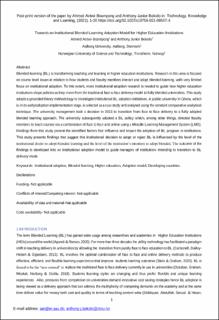| dc.contributor.author | Ahmed, Antwi-Boampong | |
| dc.contributor.author | Bokolo, Anthony Junior | |
| dc.date.accessioned | 2021-03-24T09:58:24Z | |
| dc.date.available | 2021-03-24T09:58:24Z | |
| dc.date.created | 2021-03-10T10:42:31Z | |
| dc.date.issued | 2021 | |
| dc.identifier.issn | 2211-1662 | |
| dc.identifier.uri | https://hdl.handle.net/11250/2735248 | |
| dc.description.abstract | There has been considerable interest in Blended learning (BL) and how it is transforming teaching and learning in higher education institutions. Research in this area is focused on course level issues in relation to how students and faculty members interact and adopt blended learning, with very limited focus on institutional adoption. There is the need for more institutional adoption research to guide how higher education institutions shape policies as they transition from the traditional face to face delivery model to fully blended universities. This study adopts a grounded theory methodology to investigate institutional BL adoption initiatives. A public university in Ghana, which is in its early/adoption implementation stage, is selected as a case study and analysed using the constant comparative analytical technique. The university management took a decision in 2013 to transition from face to face delivery to a fully adopted blended learning approach. The university subsequently adopted a BL policy which, among other things, directed faculty members to teach courses via a mix of face to face and online using a Moodle Learning Management System (LMS). Findings from this study present the identified factors that influence and impact the adoption of BL program in institutions. Findings from this study suggest that institutional decision to adopt or reject BL is influenced by the level of the institutional desire to adopt blended learning and the level of the institution’s intention to adopt blended. The outcome of the findings is developed into an institutional adoption model to guide managers of institutions intending to transition to BL delivery model. | en_US |
| dc.description.sponsorship | There has been considerable interest in Blended learning (BL) and how it is transforming teaching and learning in higher education institutions. Research in this area is focused on course level issues in relation to how students and faculty members interact and adopt blended learning, with very limited focus on institutional adoption. There is the need for more institutional adoption research to guide how higher education institutions shape policies as they transition from the traditional face to face delivery model to fully blended universities. This study adopts a grounded theory methodology to investigate institutional BL adoption initiatives. A public university in Ghana, which is in its early/adoption implementation stage, is selected as a case study and analysed using the constant comparative analytical technique. The university management took a decision in 2013 to transition from face to face delivery to a fully adopted blended learning approach. The university subsequently adopted a BL policy which, among other things, directed faculty members to teach courses via a mix of face to face and online using a Moodle Learning Management System (LMS). Findings from this study present the identified factors that influence and impact the adoption of BL program in institutions. Findings from this study suggest that institutional decision to adopt or reject BL is influenced by the level of the institutional desire to adopt blended learning and the level of the institution’s intention to adopt blended. The outcome of the findings is developed into an institutional adoption model to guide managers of institutions intending to transition to BL delivery model. | en_US |
| dc.language.iso | eng | en_US |
| dc.publisher | Springer | en_US |
| dc.title | Towards an Institutional Blended Learning Adoption Model for Higher Education Institutions | en_US |
| dc.type | Peer reviewed | en_US |
| dc.type | Journal article | en_US |
| dc.description.version | acceptedVersion | en_US |
| dc.source.journal | Technology, Knowledge and Learning | en_US |
| dc.identifier.doi | https://doi.org/10.1007/s10758-021-09507-4 | |
| dc.identifier.cristin | 1896887 | |
| dc.description.localcode | "This is a post-peer-review, pre-copyedit version of an article. Locked until 5.3.2022 due to copyright restrictions. The final authenticated version is available online at: http://dx.doi.org/https://doi.org/10.1007/s10758-021-09507-4 | en_US |
| cristin.ispublished | true | |
| cristin.fulltext | postprint | |
| cristin.qualitycode | 2 | |
